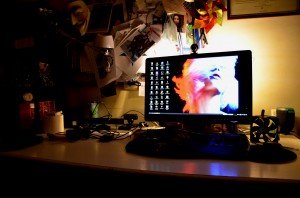PROTECT IP / SOPA Breaks The Internet from Fight for the Future on Vimeo.
Anti Counterfeiting Trade Agreement
The name is misleading. The original idea of ACTA is to internationally protect intellectual property.
It’s supposed to help prevent product & trademark counterfeiting like fake copies of expensive goods – misusing trademarks, like using using a well known car brand on tampons [for example making "General Motors" tampons].
it will safeguard research investments and development of products, e.g. medical patents or pharmaceutical products.
it’s also supposed to support artists and journalists and allow them to produce higher quality work , and internationally harmonize Copyright laws.Sounds great! Doesn’t it?
But there’s a twist to it.
The Oxford English Dictionary defines a counterfeit as: “a fraudulent imitation of something else”.
But when a file is copied on the internet it is exactly the same as the original, not an imitation. And it is not stolen since the original is not removed. The information is simply being shared free of charge. So counterfeiting has nothing to do with it.
Let us explain.
“Intellectual property” is never really defined within ACTA. It could mean trademarks, or it could mean any idea or information which later could be copyrighted, restricted and criminalized. This will have a tremendous effect on the internet as we know it.
The actual ACTA text covers a huge range of topics, and is very complex and hard to grasp. So we will explain what will happen on the internet in a hypothetical real world analogy.
Imagine paying for a cookery course. During this course you learn how to cook some really tasty fried chicken. Then you return home and teach the recipe to your wife. But here’s the catch: according to ACTA, you are now both criminals, since you shared that information for free when only YOU had paid to learn it.
The ACTA regulations are clear – when you’re suspected of sharing copyrighted information, depending on the country you live in, then your access to any kind of courses will be blocked, you will be fined or send directly to prison.
But surely no-one would find out that you shared the knowledge of secret fried chicken in private at home? And you’re right, under current law no-one would. But ACTA deals with this through excessive surveillance. All your communication will be monitored, and not only yours. Your family, your friends, all will be observed, just in case. But you don’t need privacy, civil rights or liberties, because you have nothing to hide, do you?
Now that you know the principle, let’s see how it will be applied on the internet when ACTA comes into effect.
You can imagine your internet connection like a conveyor belt running in two directions. Along the conveyor belt, packets of data are coming in and going out of your computer. Under ACTA, ISPs – the companies you pay for access to the internet – will be forced to open up and inspect every single data package you send or receive to look for copyrighted information. Send or receive copyrighted info several times and you could be disconnected from the internet or face criminal charges. That means if you send an mp3 to your friend through an instant messenger, upload a video of a party which played copyrighted music, or quote a copyrighted newspaper article in an email… You’re gone. That’s it. As if that wasn’t enough, the information about the news article you sent via email will be sent to the publisher, and based on their claims you could be fined or sent to prison.
ISPs will also be required to constantly check that no copyrighted material or links to copyrighted material are found anywhere on their servers. This will be fatal for sites that hold any kind of user-generated content, like music, pictures or video. How could Youtube or Twitter work under a law like that? So the internet as we know it is on the brink of destruction.
At least you’d think that the money from all these lawsuits would benefit creative people. But musicians, writers, movie makers, journalists, developers and researchers also lose, because they are now held by the same rules. Protected ideas now can’t be reused, refined or developed any further. Even parts of sentences could be protected and made restricted by copyright. The whole agreement only benefits a small part of the industry, the so-called “content mafia” – media publishing companies like the RIAA and the MPAA, who have long tried to solve the “internet problem” that threatens their obsolete business model. ACTA is the result of their lobbying within the governments that participate in the negotiations.
Latest leaks indicate that techniques that bypass the planned content filter and the blocking infrastructure will also be illegal.
[[And the worst thing? It's all done in secret. If you are European, it’s even done by people who haven't even been elected by the public. You've already seen where this is heading on YouTube. Videos are unavailable in certain geographical areas.
This obsessive copy-protection is also a great tool for information suppression. Once all the internet filters and blocking techniques are in place, virtually all information tagged as copyright could be suppressed. Maybe your critical blog or twitter account, or the video you made about rigged elections and environmental catastrophes, or even the pictures of your kittens. Ok, maybe not your kittens. ]]
Not unless you painted a Coca-Cola logo onto their fur.
This all sounds unbelievable for everyone who’s had even a small glimpse of how the net works, but remember, those who work on the Agreement might not have any clue what the internet is about. And once the treaty is signed, their rules will have to be implemented.
The consequences we have to deal with are:
• internet censorship
• restricted freedom of speech
• loss of Net Neutrality due to the restriction of the use of certain protocols
• total surveillance of your all online activities
• loss of freedoms and restriction of civil rights
• punishment (like losing your internet access)And we will gain:
nothing
Our leaders, who negotiate this agreement, think of us internet users as criminals.
Maybe we should think of them the same way.The time to act for the internet is now. Google ACTA. Load your tweets and Photoshops, let it be known that no-one messes with the Internet, and take it to the streets.
Stop the Kraken.



